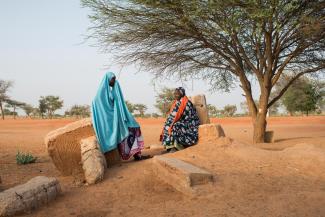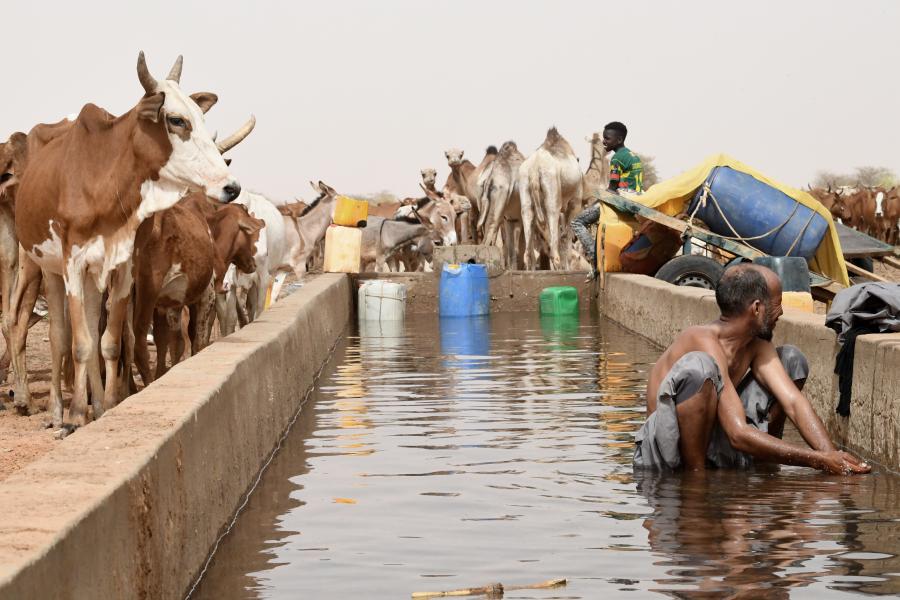Population figures | 2021 - 2025
2025 situation overview
The Sahel region is undergoing a deep transformation which calls for an adjustment in humanitarian engagement to address the worsening crisis characterized by escalating forced displacement and increased protection needs. Almost 5 million people were forcibly displaced across Burkina Faso, Mali, the Niger, Mauritania, and the coastal countries of Benin, Côte d'Ivoire, Ghana, and Togo as of August 2024 – an increase of 25% since 2020. In the first half of 2024 alone, approximately 130,000 Malians sought refuge in Mauritania. Over 150,000 people fleeing Burkina Faso sought asylum in coastal countries since 2021. In Burkina Faso, with limited opportunities for return, the number of IDPs may increase to 3.65 million by the end of 2025.
Protection risks are escalating. Data gathered in more than 2,500 communities by the inter-agency protection monitoring system Project 21, co-led by UNHCR and the Danish Refugee Council, shows that most protection incidents were directly linked to conflict, and 15% related to gender-based violence. People exposed to the most critical risks were often the hardest to reach, with almost half of the worst-affected communities facing movement restrictions, up from 39% in 2021. Two out of three households reported they had insufficient access to health services.
However, the spirit of hospitality has remained remarkably resilient, with communities generally considering relations between hosts and displaced people as good. Project 21 analysis guides evidence-based programming and the delivery of area-based responses. In 2025, protection monitoring will be extended in the Central Sahel and rolled out in the coastal countries, providing consistent protection data on the Sahel+ situation.
Political instability, conflict, violence, and food insecurity are the key drivers of displacement across the Sahel region, with the effects of climate change further intensifying tensions over scarce resources. UNHCR will remain present in the Sahel, providing protection and assistance to displaced populations and strengthening the resilience of host communities to promote social cohesion. Neighbouring countries, despite their fragilities and security concerns, are keeping their borders open and allowing access to asylum and overstretched basic services.
To adapt to the changing context, UNHCR has developed a new strategy for engagement in the Sahel. UNHCR’s response will focus on addressing emergency needs while building resilience among displaced populations and their host communities.
UNHCR will prioritize interventions at the community level to reinforce self-reliance, resilience, and peaceful coexistence, aiming at working on solutions from the start. UNHCR’s Sahel+ strategy envisages six shifts:
- transitioning from emergency response to early self-reliance and resilience;
- focusing on community interventions rather than individual assistance;
- shifting from in-kind aid to cash assistance;
- strengthening partnerships with development actors;
- strengthening local actors; and
- expanding the geographic scope of the response to include Mauritania, Algeria and the coastal countries of Benin, Côte d'Ivoire, Ghana, and Togo.
UNHCR operations have already incorporated these shifts into planned activities for 2025. In Côte d'Ivoire and Niger, livelihood support will be provided through agricultural seeds and fertilizer.
In Burkina Faso, access to credit and capital, entrepreneurship and vocational training, will target 20% of displaced and refugee households. In Niger, efforts to enhance social cohesion between host communities and refugees will be made through targeted community intervention projects by expanding existing farming cooperatives through access to arable land, tools, and cash crops. Such interventions prove to enhance self-reliance and strengthen peaceful coexistence.
UNHCR will enhance partnerships with development actors such as the United Nations Sustainable Development Cooperation Framework (UNSDCF) in Côte d'Ivoire. Localization through increased partnerships with local actors and refugee-led organizations will be a priority shift in 2025, especially to address hard-to-reach areas where local partners can operate more effectively.
The Sahel+ strategy has four priority themes: asylum and mixed movements; urbanization and solutions; youth and gender; and climate action.
In response to mixed movements, UNHCR will continue adopting alternatives to dangerous journeys in 2025 in Burkina Faso, Mali, Mauritania and the Niger, including establishing One Stop Shops with immediate protection services in key transit locations in Mali and the Niger as well as information on dangers along the journey in Burkina Faso, Mali, and the Niger. UNHCR advocates with States on access to territory and asylum in the Sahel region, supporting national eligibility commissions on refugee status determination.
Alternatives to camps will continue to be promoted through sustainable urban settlements through partnerships with development actors such as the settlement in Gao, Mali, constructed in 2024 in coordination with the Government, development actors, UN agencies and NGOs for long-term use by displaced persons and host communities.
Youth and gender-focused initiatives will remain central to enhancing livelihoods, improving access to education, supporting higher education, and addressing gender-based violence. In Burkina Faso, 25,000 displaced and refugee children will be prioritized to access education, addressing the closure of over 5,300 schools in 2024. In Mali, UNHCR will support the enrolment of 100% of school-aged children from displaced populations in formal education systems, including alternative education and vocational training programmes. Gender-based violence prevention and response services will reach 10,000 women and girls in Burkina Faso with a focus on expanding women’s safe spaces and providing psychosocial support.
Sahel countries are priority countries for climate action, and in 2025 UNHCR will expand its smart agriculture and reforestation interventions to support 3,000 households in Mali, as well as development partnerships to garner community-inclusive climate solutions.
Financial overview
Refugees and locals live side-by-side in Niger’s 'opportunity villages'
By Colin Delfosse in Maradi, Niger
In the opportunity village of Garin Kaka, Nigerian refugees live and work alongside the local host community in a more sustainable alternative to refugee camps.
Read the story







